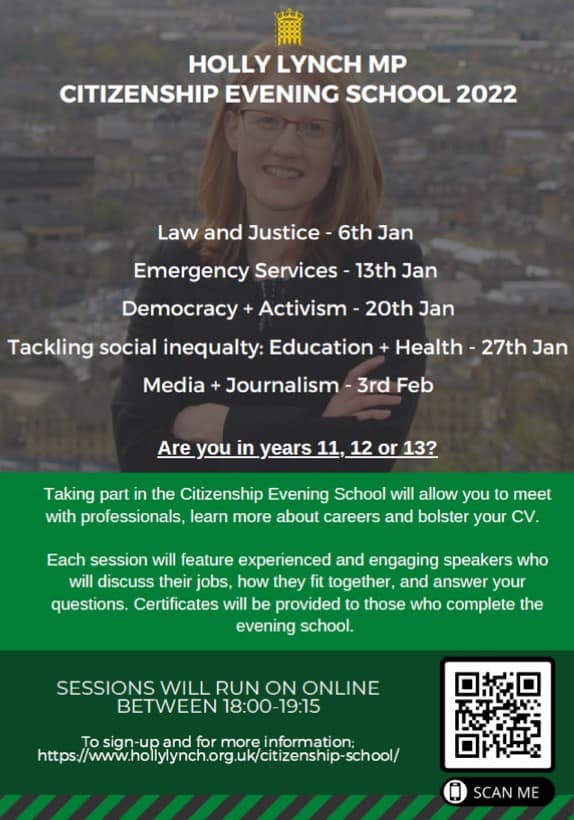Holly Lynch MP From Halifax, For Halifax

Marjan Khatib (Trinity Academy)
Over the variety of informative sessions delivered by inspiring speakers, many stood out to me with their responses and advice. “Law and Justice” was the first session and one that particularly grasped my interest, due to the topic and the passion of the speakers. A tribunal judge, Leanne Turner, spoke about the importance of a well-coordinated justice system. She inspiringly highlighted that “if there’s no trust in that system then society fails”. Lawyer Hugh Goulbourne spoke about facing moments of struggle within your role by focusing on “confidence not competence”. While competence is a certain requirement, a successful person must also be confident in the work they are doing and that it really is something they are confident about making happen. Alison Lowe, the Deputy Mayor of West Yorkshire for policing and crime, immediately stood out as a compassionate person with immense devotion towards her work. She inspirationally spoke about the many goals she has been working towards, such as educating on the racist and biased attitudes in policing “stop and search” procedures. Alison spoke confidently and in a light-hearted manner which made her very easy to listen to and to understand. Clearly, her role is done very well and with utmost spirit!
Another session in my top favourites was “Democracy and Activism” which highlighted everyone’s role and how it encompasses their moralities and goals. I asked a question about how they deal with criticism towards a cause they are working for, and I received extremely valuable answers. Dan Jarvis, MP for Barnsley Central and Mayor of South Yorkshire, acknowledged that you will attract criticism, but he gave a positive outlook on this: “Whilst there are unpleasant things, there’s a lot of goodness and decency.” Jawad Khan, the Regional Public Affairs and Campaigns Officer at the Alzheimer’s Society, advised that sometimes it is best to ignore any hateful comments. However, he emphasised the importance of looking after yourself and recognising when you shouldn’t tolerate this: “Always escalate when you’re concerned about someone’s wellbeing.” Finally, Azmina Siddique, Policy Manager at the Children’s Society, summarised the motivation to drive you forwards despite any hate: “Knowing that your values are the right thing, can keep you going.”
Overall, several sessions were delivered exceptionally by great people in impacting roles and it was a fantastic opportunity to benefit and widen our career ideas!
Isla Barrett (Greenhead College) – Media and Journalism: The Voice of the Voiceless
Journalists have been dubbed the original ‘influencers’ of our time, with the media power they hold shaping society as much as our top politicians
The talk held on the topic of Media and Journalism during the Citizenship Evening School was extremely influential and insightful, with the guest speakers providing invaluable lessons in not only this field but for success in all walks of life. Harry Horton and Aisha Iqbal Khan spoke of the great responsibility that comes with journalism, but also the merits and opportunities this field provides, while Tom Gaymor spoke of the importance of keeping an open mind and the joys of pursuing what you love.
The main responsibility is to the truth
The power the media holds brings with it unprecedented responsibility, especially for journalists and those in the public eye. This can sometimes be a burden, but the journalists spoke of the motivation it bought too to fulfil their role as factual commentators, bringing the public the news they need to hear. The true story does not lie in the press release, and so it’s paramount they construct the real narrative for the benefit of the public. Denial is often the time to investigate, as this signals buried truths. In short, journalists must be the eyes and ears of the public, bringing them the real story and reporting issues which need to be addressed to those who hold power in our society.
Trust is key
Trust, when working in the media, is of paramount importance. Whether looking for and proposing your own story, or reporting another, it will always be hard to ensure truth and accuracy, but this is the only way to gain respect and credibility among peers and the public. The journalists reported fact-checking until the second before stories air to cement a true account worthy of public attention, which both benefits the population, and ensures the particular media outlet can’t be penalised for a story based partly on fiction. This is why the line between subjectivity and objectivity is key; you must be passionate about what you report, and first-hand experience can be a blessing, but you must also be careful not to project your own biased views on a subject matter if it’s open for debate. Walking on just the right side of this line makes for the best media coverage.
You cannot predict the future
The most insightful takeaway for me was the message that anything can happen, and plans and career goals can change over time or in an instant. So whilst it is important to set goals, it’s also important to keep an open mind and understand that it’s okay if things change. We need to become comfortable with being uncomfortable; we need to feel relaxed when the limits of our comfort zone are pushed in order to progress and grow.
The talk offered invaluable lessons and reflected the importance of traditional media outlets, even in a globalised, media-saturated world. Social media was designed to give people a voice, which can be used as a force for good in multiple ways, but it doesn’t force people to listen. Traditional media coverage will always be indisputable and bring the information we need in a clear way, and that is impossible to ignore.
